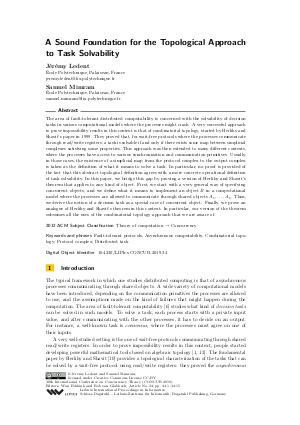A Sound Foundation for the Topological Approach to Task Solvability
Authors Jérémy Ledent, Samuel Mimram
-
Part of:
Volume:
30th International Conference on Concurrency Theory (CONCUR 2019)
Part of: Series: Leibniz International Proceedings in Informatics (LIPIcs)
Part of: Conference: International Conference on Concurrency Theory (CONCUR) - License:
 Creative Commons Attribution 3.0 Unported license
Creative Commons Attribution 3.0 Unported license
- Publication Date: 2019-08-20
File

PDF
LIPIcs.CONCUR.2019.34.pdf
- Filesize: 498 kB
- 15 pages
Document Identifiers
Subject Classification
ACM Subject Classification
- Theory of computation → Concurrency
Keywords
- Fault-tolerant protocols
- Asynchronous computability
- Combinatorial topology
- Protocol complex
- Distributed task
Metrics
- Access Statistics
-
Total Accesses (updated on a weekly basis)
0Document
0Metadata
Abstract
The area of fault-tolerant distributed computability is concerned with the solvability of decision tasks in various computational models where the processes might crash. A very successful approach to prove impossibility results in this context is that of combinatorial topology, started by Herlihy and Shavit’s paper in 1999. They proved that, for wait-free protocols where the processes communicate through read/write registers, a task is solvable if and only if there exists some map between simplicial complexes satisfying some properties. This approach was then extended to many different contexts, where the processes have access to various synchronization and communication primitives. Usually, in those cases, the existence of a simplicial map from the protocol complex to the output complex is taken as the definition of what it means to solve a task. In particular, no proof is provided of the fact that this abstract topological definition agrees with a more concrete operational definition of task solvability. In this paper, we bridge this gap by proving a version of Herlihy and Shavit’s theorem that applies to any kind of object. First, we start with a very general way of specifying concurrent objects, and we define what it means to implement an object B in a computational model where the processes are allowed to communicate through shared objects A_1, ..., A_k. Then, we derive the notion of a decision task as a special case of concurrent object. Finally, we prove an analogue of Herlihy and Shavit’s theorem in this context. In particular, our version of the theorem subsumes all the uses of the combinatorial topology approach that we are aware of.
Cite As Get BibTex
Jérémy Ledent and Samuel Mimram. A Sound Foundation for the Topological Approach to Task Solvability. In 30th International Conference on Concurrency Theory (CONCUR 2019). Leibniz International Proceedings in Informatics (LIPIcs), Volume 140, pp. 34:1-34:15, Schloss Dagstuhl – Leibniz-Zentrum für Informatik (2019)
https://doi.org/10.4230/LIPIcs.CONCUR.2019.34
BibTex
@InProceedings{ledent_et_al:LIPIcs.CONCUR.2019.34,
author = {Ledent, J\'{e}r\'{e}my and Mimram, Samuel},
title = {{A Sound Foundation for the Topological Approach to Task Solvability}},
booktitle = {30th International Conference on Concurrency Theory (CONCUR 2019)},
pages = {34:1--34:15},
series = {Leibniz International Proceedings in Informatics (LIPIcs)},
ISBN = {978-3-95977-121-4},
ISSN = {1868-8969},
year = {2019},
volume = {140},
editor = {Fokkink, Wan and van Glabbeek, Rob},
publisher = {Schloss Dagstuhl -- Leibniz-Zentrum f{\"u}r Informatik},
address = {Dagstuhl, Germany},
URL = {https://drops.dagstuhl.de/entities/document/10.4230/LIPIcs.CONCUR.2019.34},
URN = {urn:nbn:de:0030-drops-109365},
doi = {10.4230/LIPIcs.CONCUR.2019.34},
annote = {Keywords: Fault-tolerant protocols, Asynchronous computability, Combinatorial topology, Protocol complex, Distributed task}
}
Author Details
References
- Elizabeth Borowsky and Eli Gafni. Generalized FLP Impossibility Result for T-resilient Asynchronous Computations. In Proceedings of the Twenty-fifth Annual ACM Symposium on Theory of Computing, STOC '93, pages 91-100, New York, NY, USA, 1993. ACM. URL: https://doi.org/10.1145/167088.167119.
- Armando Castañeda, Sergio Rajsbaum, and Michel Raynal. Unifying Concurrent Objects and Distributed Tasks: Interval-Linearizability. J. ACM, 65(6):45:1-45:42, 2018. URL: https://doi.org/10.1145/3266457.
-
Ivana Filipović, Peter O’Hearn, Noam Rinetzky, and Hongseok Yang. Abstraction for concurrent objects. Theoretical Computer Science, 411(51):4379-4398, 2010. European Symposium on Programming 2009.

-
Eli Gafni, Sergio Rajsbaum, and Maurice Herlihy. Subconsensus Tasks: Renaming Is Weaker Than Set Agreement. In Shlomi Dolev, editor, Distributed Computing, pages 329-338. Springer Berlin Heidelberg, 2006.

- Éric Goubault, Jérémy Ledent, and Samuel Mimram. Concurrent Specifications Beyond Linearizability. In 22nd International Conference on Principles of Distributed Systems, OPODIS 2018, pages 28:1-28:16, 2018. URL: https://doi.org/10.4230/LIPIcs.OPODIS.2018.28.
-
Maurice Herlihy, Dmitry Kozlov, and Sergio Rajsbaum. Distributed Computing Through Combinatorial Topology. Morgan Kaufmann Publishers Inc., 2013.

- Maurice Herlihy and Sergio Rajsbaum. Set Consensus Using Arbitrary Objects (Preliminary Version). In Proceedings of the Thirteenth Annual ACM Symposium on Principles of Distributed Computing, PODC '94, pages 324-333, New York, NY, USA, 1994. ACM. URL: https://doi.org/10.1145/197917.198119.
- Maurice Herlihy and Sergio Rajsbaum. Algebraic topology and distributed computing: a primer, pages 203-217. Springer Berlin Heidelberg, 1995. URL: https://doi.org/10.1007/BFb0015245.
- Maurice Herlihy, Sergio Rajsbaum, and Mark R. Tuttle. Unifying Synchronous and Asynchronous Message-passing Models. In Proceedings of the Seventeenth Annual ACM Symposium on Principles of Distributed Computing, PODC '98, pages 133-142, New York, NY, USA, 1998. ACM. URL: https://doi.org/10.1145/277697.277722.
- Maurice Herlihy and Nir Shavit. The Topological Structure of Asynchronous Computability. J. ACM, 46(6):858-923, November 1999. URL: https://doi.org/10.1145/331524.331529.
-
Maurice Herlihy and Jeannette M. Wing. Linearizability: A Correctness Condition for Concurrent Objects. ACM Transactions on Programming Languages and Systems, 12(3):463-492, 1990.

- Nancy A. Lynch and Mark R. Tuttle. An introduction to input/output automata. CWI Quarterly, 2:219-246, 1989. URL: http://citeseerx.ist.psu.edu/viewdoc/summary?doi=10.1.1.83.7751.
- Michael Saks and Fotios Zaharoglou. Wait-free K-set Agreement is Impossible: The Topology of Public Knowledge. In Proceedings of the Twenty-fifth Annual ACM Symposium on Theory of Computing, STOC '93, pages 101-110, New York, NY, USA, 1993. ACM. URL: https://doi.org/10.1145/167088.167122.
